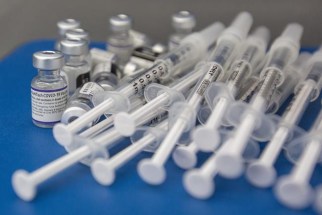No reason to lose faith in vaccines
Read this article for free:
or
Already have an account? Log in here »
To continue reading, please subscribe:
Monthly Digital Subscription
$0 for the first 4 weeks*
- Enjoy unlimited reading on winnipegfreepress.com
- Read the E-Edition, our digital replica newspaper
- Access News Break, our award-winning app
- Play interactive puzzles
*No charge for 4 weeks then price increases to the regular rate of $19.00 plus GST every four weeks. Offer available to new and qualified returning subscribers only. Cancel any time.
Monthly Digital Subscription
$4.75/week*
- Enjoy unlimited reading on winnipegfreepress.com
- Read the E-Edition, our digital replica newspaper
- Access News Break, our award-winning app
- Play interactive puzzles
*Billed as $19 plus GST every four weeks. Cancel any time.
To continue reading, please subscribe:
Add Free Press access to your Brandon Sun subscription for only an additional
$1 for the first 4 weeks*
*Your next subscription payment will increase by $1.00 and you will be charged $16.99 plus GST for four weeks. After four weeks, your payment will increase to $23.99 plus GST every four weeks.
Read unlimited articles for free today:
or
Already have an account? Log in here »
Hey there, time traveller!
This article was published 03/02/2022 (1405 days ago), so information in it may no longer be current.
It’s a story that both perplexed and worried vaccine advocates. According to a Free Press-Probe Research poll released this week, 40 per cent of respondent Manitobans are starting to doubt the effectiveness of COVID-19 vaccines, particularly in preventing people from getting sick.
Medical and scientific experts were quick to raise concern about the poll’s findings, although they did not seem all that surprised at the level of skepticism.
Omicron tests Manitobans’ faith in vaccines

Posted:
With the Omicron variant leaving many Manitobans sickened with COVID-19, a large minority are now questioning the effectiveness of vaccines.
At this stage in the pandemic, with restriction fatigue running high and the Omicron variant driving more breakthrough cases, it’s to be expected that people would be raising questions about the efficacy of vaccines. That having been said, Manitobans need to be very careful about buying too much into the assertions being made — largely by the unvaccinated — that vaccines are not a valid form of protection.
When COVID-19 vaccines were first made widely available just over a year ago, specific assertions were made by the companies producing them and the governments buying and distributing them. We were told the vaccines were 75 or 85 or even 90 per cent effective at preventing COVID-19 infection. As well, we were told the vaccines would, in the event of a breakthrough infection, further protect vaccinated people from becoming seriously ill or dying.
The important fact behind those initial assertions is that breakthrough infections — positive cases in people who are partially or fully vaccinated — have always been part of the value proposition around vaccines. COVID-19 vaccines have been quite successful at preventing infection with previous variants of the virus.
Even so, all the available data shows that vaccines have proven not only to protect people from catching COVID-19; they are also extremely effective at preventing serious illness requiring hospitalization and perhaps leading to death in the event of a breakthrough.
Those benefits have endured, even as the Omicron variant has shown its capacity to infect a greater number of vaccinated persons.
The global data supporting these findings could not be more compelling.
Since the beginning of the pandemic in Canada, 72 per cent of all hospitalizations and 70 per cent of all deaths have involved unvaccinated individuals.
In Canada, 53 per cent of all COVID-19 infections (771,000) have involved the unvaccinated; 44 per cent (640,000) involved people who were partially or fully vaccinated. That distribution of confirmed infections has proven to be a boon to the anti-vaccination movement, which seizes on these selected figures as proof that vaccines really don’t work.
However, when you look at hospitalizations and deaths, a much different picture emerges.
Since the beginning of the pandemic in Canada, 72 per cent of all hospitalizations and 70 per cent of all deaths have involved unvaccinated individuals. And for those who think that the data is skewed because it includes cases prior to the introduction of vaccines, or doesn’t apply to the threat from Omicron, take note: the positive trends have continued both in Canada and around the world.
It all means that while the role of vaccines has changed slightly with the arrival of Omicron, they remain as important and effective today as they have ever been.
According to the United States Centers for Disease Control and Prevention, unvaccinated adults are currently 13 times more likely to test positive for COVID-19, 16 times more likely to require hospitalization and 68 times more likely to die. These are calculations that mirror real-world results in other countries, including Canada.
It all means that while the role of vaccines has changed slightly with the arrival of Omicron, they remain as important and effective today as they have ever been.
Vaccine proponents should consider ways of amplifying the messaging around vaccines to avoid any growth in skepticism. Vaccines are living up to advance billing in every regard. We might just need to do a better job of reminding people of that fact going forward.

1.jpg?h=215)






